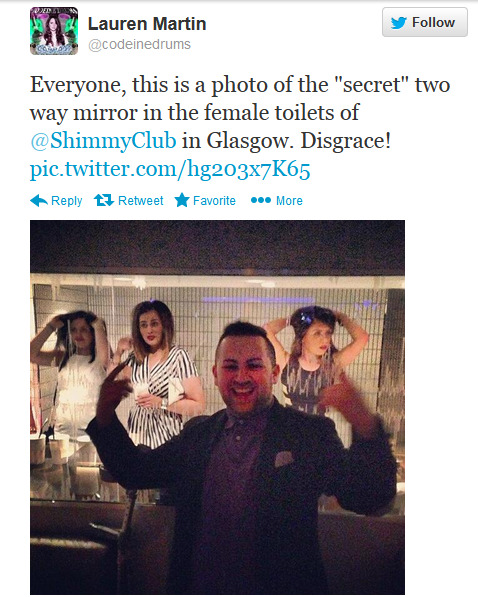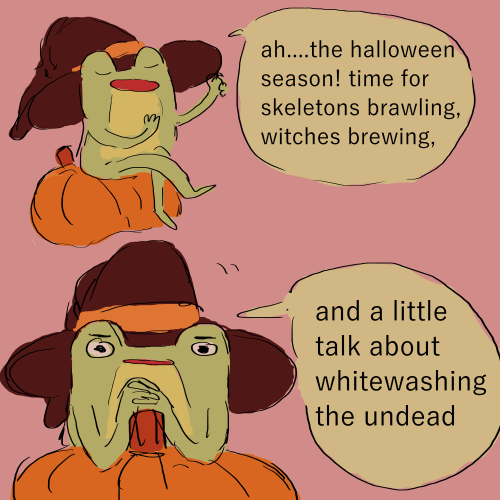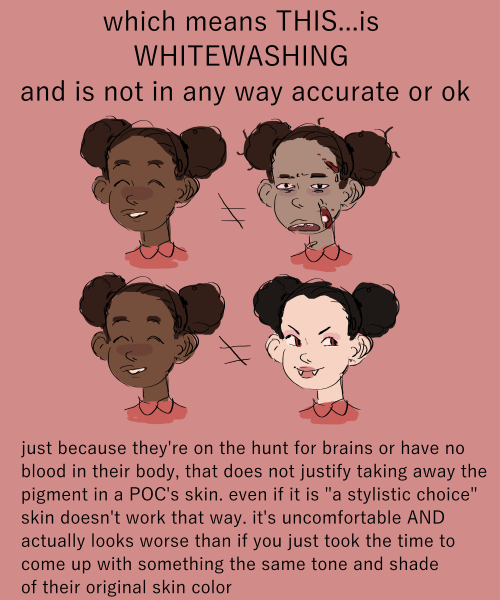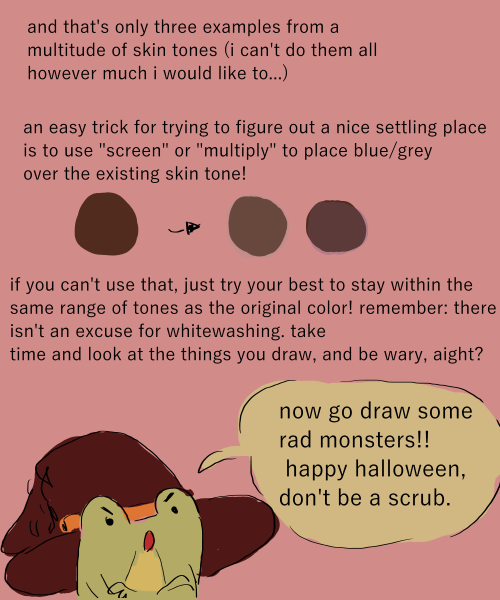Latest Posts by mclennonlovebot - Page 6
So I was just brushing my teeth and starzed thinking about how cishets get so worked up about gendering things even toothbrushes and I was like 'are they worried that using the wrong toothbrush is gonna turn their teeth gay' yknow all that ridiculous stuff haha gay teeth and then my comedic genius brain went 'well mine certainly aren't straight!' and then I laughed at how funny I am
*adjusts microphone*
IT’S NOT OKAY TO DEADNAME YOUR KIDS WHEN YOU’RE MAD AT THEM
if this year keeps going to shit i know who we need to call to save us

this yellow submarine scene always makes me laugh

A Glasgow nightclub has installed a two-way mirror which allows male revellers in private booths to spy on unsuspecting women as they visit the toilet! With no notification or signage anywhere in the venue many female club goers have been left feeling embarrassed and used. Although they do briefly show the mirrors in a promo video, the club has been quickly deleting comments and posts on their social media from club goers trying to alert others to the situation. This is pretty much illegal and hugley violates privacy. Thank you The Shimmy Club for giving us a shiny, new, creative and cool take on objectification. article here
i’m never leaving my house again, this world is just too fucked up.
i wish this new wave of “grunge” was still poor/mentally ill people making art about their struggles and not the girls that bullied me in high school wearing a $60 flannel lol
silly me, how dare i sit here & hope that people will someday wake the fuck up & realize john lennon wasn’t a “wife beater.”
i guess making him seem like anything but the worst man in existence ruins the internet’s favorite classic rock punching bag.
it’s ace week! give every ace you know 20$ and a consensual hug
reblog and put in the tags what fandom you joined tumblr for
Mid-June?, 1972: John talks to Sandra Shevey about having a partner who fulfills both creative and romantic aspirations, and the disorienting experience of working with Yoko for the first time as competitive equals in the recording studio on Some Time In New York City. (Note: @sweating-cobwebs, consider this is my gift to you.)
JOHN: It’s a plus, it’s not a minus. The plus is that your best friend, also, can hold you without… I mean, I’m not a homosexual, or we could have had a homosexual relationship and maybe that would have satisfied it, with working with other male artists. [faltering] An artist – it’s more – it’s much better to be working with another artist of the same energy, and that’s why there’s always been Beatles or Marx Brothers or men, together. Because it’s alright for them to work together or whatever it is. It’s the same except that we sleep together, you know? I mean, not counting love and all the things on the side, just as a working relationship with her, it has all the benefits of working with another male artist and all the joint inspiration, and then we can hold hands too, right?
SHEVEY: But Yoko is a very independent person. Isn’t it— [inaudible]
JOHN: Sure, and so were the men I worked with. The only difference is she’s female.
SHEVEY: But you didn’t find it difficult to make that transition?
JOHN: Oh yeah. I mean, it took me four years. I’m still not – I’m still only coming through it, you know.
“The next thing I felt was arms being put around me and somebody hugging me. And it was John. And he just looked and said “Are you alright?” and I realized that only he and I felt this enormous emotional loss of Brian.”
— Paul talking about the first band meeting after Brian Epstein’s death.
“As the meeting was drawing to a weary close, John, not this day with Yoko, who hadn’t seemed particularly connected with what was going on, said he wanted to play us a tape he and Yoko had made. He got up and put the cassette into the tape machine and stood beside it as we listened. The soft murmuring voices did not at first signal their purpose. It was a man and a woman but hard to hear, the microphone having been at a distance. I wondered if the lack of clarity was the point. Were we even meant to understand what was going on, was it a kind of artwork where we would not be able to put the voices into a context, and was context important? I felt perhaps this was something John and Yoko were examining. But then, after a few minutes, it became clear. John and Yoko were making love, with endearments, giggles, heavy breathing, both real and satirical, and the occasional more direct sounds of pleasure reaching for climax, all recorded by the faraway microphone. But there was something innocent about it too, as though they were engaged in a sweet serious game. John clicked the off button and turned again to look toward the table, his eyebrows quizzical above his round glasses, seemingly genuinely curious about what reaction his little tape would elicit. However often they’d shared small rooms in Hamburg, whatever they knew of each other’s love and sex lives, this tape seemed to have stopped the other three cold. Perhaps it touched a reserve of residual Northern reticence. After a palpable silence, Paul said, “Well, that’s an interesting one.” The others muttered something and the meeting was over. It occured to me as I was walking down the stairs that what we’d heard could have been an expression of 1960s freedom and openness but was it more likely that it was as if a gauntlet had been thrown down? “You need to understand that this is where she and I are now. I don’t want to hold your hand anymore.”
— Michael Lindsay-Hogg (filmmaker), Luck and Circumstance: A Coming of Age in Hollywood, New York, and Points Beyond. (2011)








After their breakup the deal was that John could say things about Paul, but if you did – if anyone said anything bad about Paul, John would take a swing at you. He’d say, “You can’t talk about Paul like that.” Paul was his best buddy. If you were talking to Paul, and you said something derogatory about John, he’d get up and leave. Paul was more of a peaceful guy, but John had that hot head, and he would say, “You wanna talk about Paul? Let’s go.” You weren’t allowed to say anything bad about Paul or John to each one of them. They would defend each other to the nth degree – which I liked. I thought that was great. You knew that they were connected at the hip. Honestly, the two of them as friends, there was never a time when they wouldn’t have fought for the other guy. They would just write songs. That’s how they fought: writing songs. – Alice Cooper
some gifs that are too precious not to share,,, i'm so in love with them being in love


when john makes paul laugh-

shy boyfriends

john just wanted to give you a massage, paul, don't be mean

this one... just melts my heart


paul being a wife and john looking at paul like he always does... *sigh*
1966 Press Conference
Q: Why did you subject yourself to a public apology in front of television cameras?
JOHN: If I were at the stage I was five years, I would have shouted we’d never tour again, pack myself off, and that would be the end of it. Lord knows, I don’t need the money. But the record burning, that was a real shock, the physical burning. I couldn’t go away knowing that I’d created another little pocked of hate in the world. Especially with something as uncomplicated as people listening to records, dancing, and enjoying what the Beatles are. Not when I could do something about it. If I said tomorrow I’m not going to play again, I still couldn’t live with somebody hating for something so irrational.
Q: Why don’t you tell your fans all this?
JOHN: But that’s the trouble with being truthful. You try to apply truth talk, although you have to be false sometimes because this whole thing is false in a way, like a game. But you hope that if you’re truthful with somebody, they’ll stop all the plastic reaction and be truthful back and it’ll be worth it. But everybody is playing the game and sometimes I’m left naked and truthful with everybody biting me. It’s disappointing. I can’t express myself very well, that’s my whole trouble. I was just commenting, in my illiterate way of speaking.
“John loved his Uncle George, who was a big soft-hearted gentleman. He could speak fluent French and was a wonderful artist who’d won scholarships at school.
He was very attentive to John. He bought him his first bicycle and would take him for walks into the Woolton countryside and tell him about nature.”
“He was well read and would read entire books out loud to John.”
“He was particularly fond of John and when the boy was four and a half years old, taught him to read by reciting the headlines from the Liverpool Echo to him. He also taught John how to draw and paint and bought him his first mouth organ.”
Oh god. I find Uncle George’s death absolutely one of the saddest parts of John. I think it changed his life so much. And he barely speaks about him. (Or when he does it’s often as part of this pattern of loss and grief that would last all his life, not really about his uncle in particular.)
I’d be so interested to know how much Paul and John ever spoke about him, but especially when John was young. When Paul talks about their connection it’s always ‘we’d lost our mums’ - and I know it’s a huge thing between them, I am not trying to lessen Julia’s death - but when they first knew each other John hadn’t lost his mum. But he’d already lost his father-figure, aged 14, the parental figure he was closest to by all accounts. And lost him in a similar way - not the exact circumstances, but where he was kept somewhat removed from it - they didn’t tell him for a few days until he came home from holiday - and he felt shame/guilt about his initial reaction which was nervous laughter. In some ways it’s more the mirror image with Paul’s situation than Julia is - although admittedly not the mirror image in how much emotional importance John puts on it. I wish we had so much more information about it. I really wonder if he and Paul talked about it at that time, or if he was able to be open about his feelings with himself, much less with Paul.
(I also wonder if Paul knew that when John said that heartless thing about ‘how can you sit there with your mum dead’, it was coming from a place where John did know some of how he was doing that, of being forced to get on with things, despite this huge loss in your life, that strange sense of unreality. I’m not saying that makes it better, it’s still a very cruel thing to do. But I think it changes colour a little bit.)
And all the evidence there is suggests that John was really close with George. He supported John in basically all the things he loved: books, writing, art, music. He bought him his dog. There’s a lovely thing Mimi says about them leaving her a chocolate bar and a note that said ‘have a happy day’ while they went off for their days out. And John leaving George notes asking him to come and tuck him into bed. When he died, didn’t John keep George’s coat and wear it everywhere for years after? But there is so little weight to him in John’s emotional story. And I just never know if John didn’t talk about him because it was just one thing that the press and his terrible biographers left him alone about, so he didn’t feed it to them, or if he genuinely didn’t connect with it very much.
Every biographer rushes over Uncle George’s death to get to Julia, and I think some of that is because John’s emotions rush over it, to get to Julia. But he raised John from 4 to 14. I think it’s easy to forget that calling him ‘Uncle George’ doesn’t mean he wasn’t his dad in a lot of ways that matter.





*cracks open a bag of candy and a jar of salt* SO, HALLOWEEN PSA TIME

Paddy, Klaus and Gibson (Paddy Chambers, Gibson Kemp and Klaus Voormann) with their manager, Brian Epstein, at Granada Television Studios, Manchester, circa August 1965.
“Paddy is intelligent, interesting and slightly introspective. Klaus is clever, artistic and a dream. Gibson is charming, amusing and nice. […] They make a solid, fat, instrumental sound above which Paddy’s slightly-plaintive voice wails away. The best bit for me is where Klaus and Gibson join it all for a few bars with a high-pitched harmony.”
- Brian Epstein (The Newcastle Evening Chronicle - March 26 1966)
![[August 1, 1965]](https://64.media.tumblr.com/03234ad083082421afb8e410a767c6d3/ef9ed94bb4b1397b-ad/s500x750/27989ce056e9d22b4ad6fecc8cb434c9b4577e57.jpg)
[August 1, 1965]







that was fun


the beatles get punny
this is possibly my favourite scene from a hard days night. john playing around in the bath is what i live for
January, 1964: John works on the composition of ‘If I Fell’.
JOHN: So I hope you see that I / Would love to love you / I hope that she won’t cry / When she learns we are two / We’re two / Gonna be the two two of us in love / Two two of us in love…
John Lennon orders sushi…


John writing ‘I love Elvis’ on a portrait of Paul.
John defacing a portrait of Paul.




February 27, 1964 at EMI Studios (Abbey Road) / June 12, 1964 Adelaide press conference
PART 2
Paul hearing Just Like Starting over over the phone
John’s death
Paul’s last conversation with John
Sean and John’s death
PART 4
John and Paul’s attitude
Ying and yang/ Marriages/ opposite attract
Strawberry Fields
“Was ‘Dear Friend’ about John Lennon, and 'Let Me Roll It’ a deliberate Lennon pastiche? 'Dear Friend’ was written about John, yes. I don’t like grief and arguments, they always bug me. Life is too precious, although we often find ourselves guilty of doing it. So after John had slagged me off in public I had to think of a response, and it was either going to be to slag him off in public - and some instinct stopped me, which I’m really glad about - or do something else. So I worked on my attitude and wrote 'Dear Friend’, saying, in effect, let’s lay the guns down, let’s hang up our boxing gloves. 'Let Me Roll It’ was not really a Lennon pastiche, although my use of tape echo did sound more like John than me. But tape echo was not John’s exclusive territory! And you have to remember that, despite the myth, there was a lot of commonality between us in the way that we thought and the way that we worked.”
— The Paul McCartney Interview, Club Sandwich, 1994.
Proof that 1967 was their best year
in 1967 the beatles became FREE.
Free from their iconic and teen image they gave themselves for the screaming fans and magazines. They were not 4 cute lads anymore. They literally could do what they wanted with their image, body, clothes, and life. Also, they grew up, they became independent. Each one of them got a new house, an independent life. They stopped touring. They could handle their public and private life as they wanted. That’s why I love how it’s even more blatant that John and Paul spent countless time together, in London, full of fans who turned out to be their paparazzi, taking candids and following them everywhere.
First proof, look at this:

This is my favourite photo of them of all time. It was late night, they were going to abbey road recording sgt pepper, coming from Paul’s house. They look like a married couple to me. They spent more time together than with their supposed girlfriends and wives.
v This was taken by a fan. John in front of Paul’s house v

Alwayss together. Always.
This looks like a peaceful sunday afternoon to me.


In his interview, Paul likes to tell how many times they wrote songs in the evening, and spent the night in the studio, recording.

John going to Paul’s house, writing songs with him, have dinner together, having fun with Martha. Domestic bliss.

^ ^ ^ Another favourite of mine. ^ ^ ^
This was taken by a fan who saw them getting out Paul’s house together to bring Martha at the park. They look like today rockstars in LA. Look at Paul, he looks like he was born in 1992. Sneakers, tight jeans, a shirt and a stylish jacket. And John? He’s wearing Paul’s poncho. Or John’s. I still haven’t understood, since they both shared their clothes. And in 1967 we’ve got many proofs.



1967 is also the best year for their look.
Paul has always been beautiful, but in my opinion nothing will ever beat 1967.

And John?

Wasn’t he damn beautiful? Finally expressing his true self and look. The iconic glasses, the hair. And that smile.

Tell me there’s something better than this, I won’t believe you. It doesn’t exist.

Here you are. The greatest music partnership of all time. My secret desire is to see a David Bailey photoshoot remade in 1967. How beautiful it would be.
1967 was their first and last year of free marital bliss. Before India arrived, before Yoko arrived, before the end.
